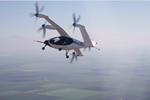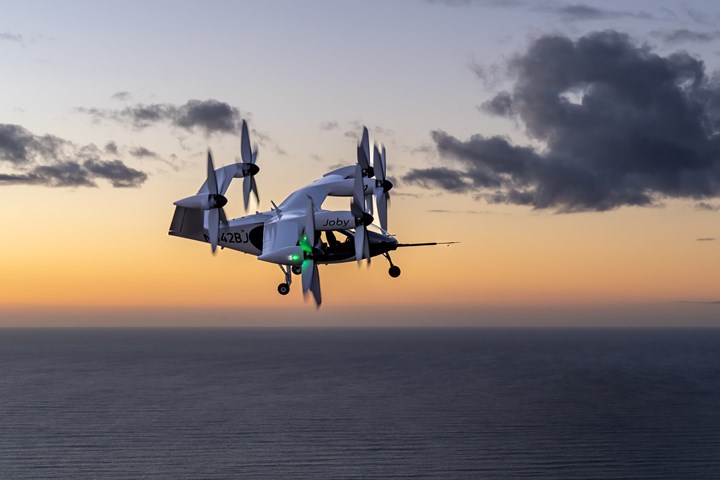Joby completes second of four system reviews with the FAA
Series of system reviews serve to validate the overall architecture of Joby’s eVTOL aircraft, ensure the company’s development process is on track to satisfy FAA safety objectives.
Joby’s all-electric production prototype aircraft during a test flight near the company’s facilities in Marina, California. Photo Credit: Joby Aviation
On Dec. 14, Joby Aviation (Santa Cruz, Calif., U.S.) announced the completion of its second of four system reviews required by the Federal Aviation Administration (FAA) as part of the company’s aircraft type certification program.
The successful completion of the in-person, multi-day audit by the FAA at Joby’s facilities in Marina, Calif., U.S., is said to demonstrate the company’s continued leadership on the path to certifying its electric vertical takeoff and landing (eVTOL) aircraft (see “Joby Aviation maintains momentum with eVTOL certification, operational and manufacturing readiness”).
The series of system reviews serve to validate the overall architecture of the aircraft and ensure Joby’s development process is on track to satisfy the FAA’s safety objectives associated with complex aircraft systems. The system reviews take place alongside the ongoing submission of Means of Compliance, area-specific certification plans and other certification documents that cover specific elements of the Joby aircraft and its systems.
In September 2022, Joby announced during its third quarter results call that 84% of its Means of Compliance had been accepted by the FAA, with four area-specific certification plans submitted for approval. Earlier this year, Joby announced the completion of its first systems and compliance reviews and carried out its first for-credit FAA conformity tests.
“Progress on certification is a key area of focus for this nascent sector, and we’re pleased to mark our continued leadership with the successful completion of our second System Review,” Didier Papadopoulos, head of aircraft OEM at Joby, says. “We’re confident that our aircraft design is on track to meet the FAA’s expectations regarding system-level safety, redundancy and overall aircraft architecture. We’re grateful to the FAA for their dedication to safety and deep engagement on our ongoing certification program.”
In May, Joby received its Part 135 Air Carrier Certificate from the FAA, enabling the company to operate a commercial air taxi service in the U.S. Joby intends to certify its aircraft in time to commence commercial passenger service in 2025 (see “FAA’s eVTOL shift pushes Joby’s launch into 2025”).
Related Content
-
Plant tour: Middle River Aerostructure Systems, Baltimore, Md., U.S.
The historic Martin Aircraft factory is advancing digitized automation for more sustainable production of composite aerostructures.
-
PEEK vs. PEKK vs. PAEK and continuous compression molding
Suppliers of thermoplastics and carbon fiber chime in regarding PEEK vs. PEKK, and now PAEK, as well as in-situ consolidation — the supply chain for thermoplastic tape composites continues to evolve.
-
ASCEND program update: Designing next-gen, high-rate auto and aerospace composites
GKN Aerospace, McLaren Automotive and U.K.-based partners share goals and progress aiming at high-rate, Industry 4.0-enabled, sustainable materials and processes.
















